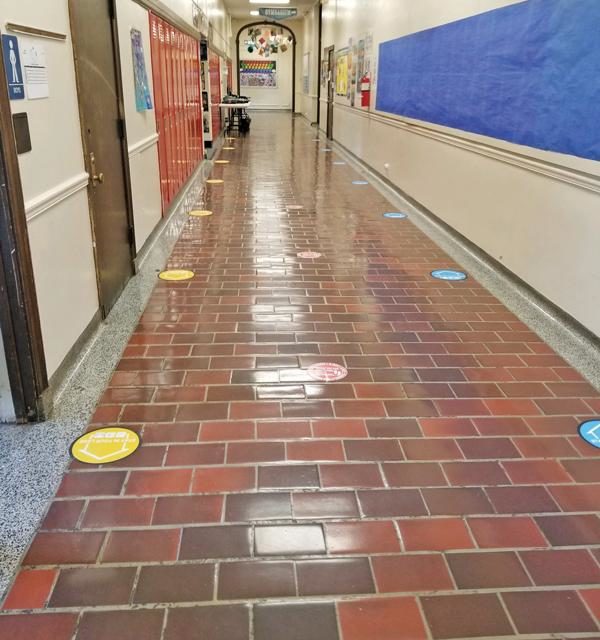At the end of an emotional five-and-a-half-hour meeting in February, the Ann Arbor Board of Education asked superintendent Jeanice Swift to develop a plan for bringing students with the greatest needs back to school for face-to-face instruction but have the rest of the kids finish the year virtually.
Only a month earlier, the schools announced an in-school hybrid learning option starting in March. Now it looked like the vast majority of AAPS students wouldn’t see a classroom this school year.
Parents were understandably ‘confused–and furious. “People were really inflamed,” board president Bryan Johnson reports. He acknowledges “it wasn’t our best hour as a board.”
A week later the board reversed itself. Members voted six-to-one to implement Swift’s recommendation to offer the first in-school classes in a year on March 25.
“Several things happened in those intervening days,” Swift explains. “While cases continued to drop, the vaccine came through [and] we were provided with rapid antigen testing.”
“It’s a game changer,” Swift says. “Those are the tools that we needed for many, many months.” The superintendent describes the reactions of parents, teachers and staff as “a wild mixture of emotions, of being overjoyed and also of having very reasonable concerns.”
The Washtenaw County Health Department set aside vaccine doses specifically for school teachers and staff. While she can’t make them get the shot, Swift says, they “will have had the opportunity, the invitation, for the vaccine.
Administrators won’t even know how many teachers and staff get vaccinated, because “that’s private medically protected information,” Swift adds. “We know vaccine hesitation is real, so we’re not under the illusion that we’ll have a hundred percent. We believe that most folks will take advantage of it.”
Families will have an option too: those who want to can keep their kids in fully virtual learning. In mid-March, it looked like about one-third would choose that.
The rest will be split into two cohorts, one attending in person on Mondays and Tuesdays, the other on Thursdays and Fridays. Everyone will continue to learn from home on Wednesdays, while teachers have virtual meetings and schools are cleaned.
“That means on any given day, we would have 30 percent of the student body present,” Swift says, “which is what allows us to complete all these mitigation strategies.” Along with socially distanced classrooms, mandatory mask-wearing, and cleaning deeply and often, they’ve upgraded ventilation systems and installed touchless water fountains and restroom facilities.
As the Observer went to press, pre-K, kindergarten, and special needs students were scheduled to return first, on March 25. First- and second-graders would follow on April 5, and third- through fifth-graders on April 12, with upper grades phasing in after that.
Swift says all teachers will return to the classroom except those assigned to fully virtual teaching. Some older teachers are choosing to retire rather than return, she says, but it’s too soon to know how many.
After hitting an all-time peak of 18,054 students in 2019-2020, AAPS enrollment fell by 547 this year. “Forty percent of [the drop] falls across our young five, kinder, and first grade classrooms where parents have essentially made the decision to wait a year,” says Swift. “We have forty-four fewer students at the high school level,” most of them international students–with pandemic travel restrictions, those programs didn’t operate this year.
The county’s number of Covid cases among children is low. Washtenaw County health officer Jimena Loveluck (see Ann Arborites, p. 21) says that of 17,000 cases in the last year, only 8 percent involved kids under eighteen–and “in most cases it has not been severe illness.” Loveluck adds that children are “not major sources of transmission either to their peers or to adults that are around them. And most importantly, [there’s] very little evidence of outbreaks due to classroom learning.”
Since it’s not yet certain that vaccination prevents the virus from spreading, Loveluck says, “even people who are fully vaccinated should continue wearing face masks.” She also points out that as of mid-March, only about a quarter of county residents had been vaccinated. “We haven’t reached the state’s goal which is 70 percent” by the end of this year–more than five million people.
When the AAPS stayed virtual last fall, some parents opted to send their kids to private schools that were teaching in person. Karen Rendell says that for her two daughters “virtual learning was very hard.” When she “started to see a lot of behavioral and emotional issues,” she sent them to Daycroft, a Montessori-inspired school in Scio Township. “They love it,” says Rendell and so does she: “Academically, it’s fantastic.”
She’ll keeping them there for at least the rest of the school year. She doesn’t want to disrupt their education again, she says, and this way, they’ll “continue to receive in-person instruction five days a week with very little technology time.” In March Rendell was moving forward with Daycroft’s financial aid and enrollment process for fall–but emails that they “are still a prospective AAPS family for future years.”
The district is planning to offer summer school and will return to full five-day-a-week classes for all students in the fall–though what either will look like has yet to be decided. “We will [also] continue to have a fully virtual delivery in the district,” Swift says, “because we have a number of families who’ve found this to be their preferred method.”
One happy note: the district has announced that high school seniors, who’ve missed out on most traditional rites of passage this year, will be able to gradutate in person in June–socially distanced at EMU’s Rynearson Stadium.


